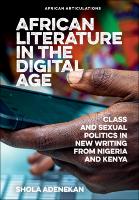African Literature in the Digital Age
Class and Sexual Politics in New Writing from Nigeria and Kenya
Author(s)
Adenekan, Shola
Collection
Knowledge Unlatched (KU)Language
EnglishAbstract
The first book-length study on the relationship between African literature and new media. The digital space provides a new avenue to move literature beyond the restrictions of book publishing on the continent. Arguing that writers are putting their work on cyberspace because communities are emerging from this space, and because increasing numbers of Africans use the internet as part of their day-to-day engagement with their societies and the world, Shola Adenekan explores this transformative development in Nigeria and Kenya, both significant countries in African literature and two of the continents largest digital technology hubs. Queer Kenyans and Nigerians find new avenues for their work online where print publishers are refusing to publish short stories and poems on same-sex desire. Binyavanga Wainainas rise to critical acclaim arguably started on the literary blog Generator 21. Chimamanda Ngozi Adichies literary celebrity partly relies on her prolific use of social media to tell thestory of powerful Nigerian women. With further examples from the development of literature across the continent, this innovative book sheds new light on narratives about digital Africa. It will also be the first major work to provide a trajectory of class consciousness in Kenyan and Nigerian writing. Through this analysis, the book articulates the difference in attitudes towards queerness, sexuality, and hetero-normativity among successive generations of writers.
Keywords
Social Science; Media Studies; Literary Criticism; African; Literary Criticism; LGBTQ+ISBN
9781847012388, 9781787448582, 9781800100886Publisher
Boydell & BrewerPublisher website
https://boydellandbrewer.com/Publication date and place
2021Grantor
Imprint
Boydell & Brewer LtdClassification
Media studies
Literature: history and criticism


 Download
Download Download
Download